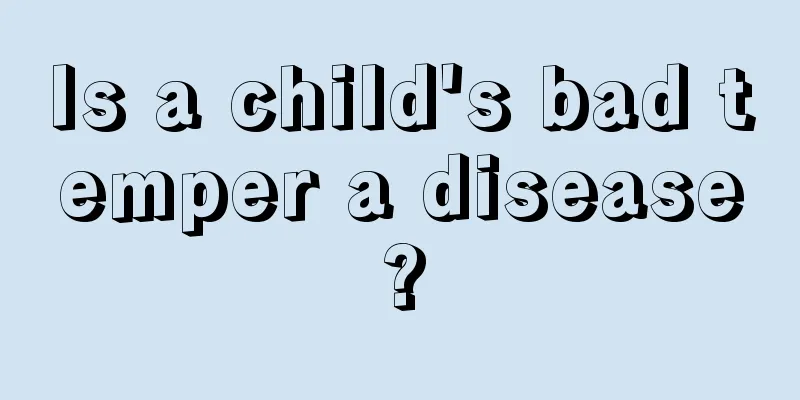What are the symptoms of indigestion in babies?

|
Nowadays, many children like to eat snacks, and many children like to eat fast food, especially some fried foods. Some even eat these things every day. This is not good for children's health, especially young children. Many parents think that it is okay for children to eat some snacks, but it is not good to form such a habit. Many babies have symptoms of indigestion because of eating some snacks. So, what are the symptoms of indigestion in babies? Let me introduce them below. Symptoms of poor digestion in babies 1. For young babies, the common symptom is regurgitation of milk. Older children often have vomiting, which is generally not serious and the vomit has a sour taste. 2. The child has a loss of appetite, abdominal distension, and hyperactive bowel sounds. You can even hear the "gurgling" sound of the stomach without a stethoscope. Children have loss of appetite, abdominal distension, and hyperactive bowel sounds 3. Bad breath. When milk and food stagnate in the stomach, bad breath often occurs first, especially bad breath and sour mouth in the morning, which are manifestations of milk and food stagnation. Clinically, this is called high-level food withdrawal. When this happens, you can reduce your food intake or skip one meal to help recover your gastrointestinal function. 4. Foul-smelling stool. When there is a small amount of undigested food residue, although there is no loose diarrhea, it is a sign of food poisoning and diarrhea. At this time, you should immediately reduce the amount of food you eat and make adjustments to avoid diarrhea. Causes of indigestion in babies 1. The food given is not easy to digest: Parents should gradually change the diet from liquid to semi-liquid such as rice soup, paste food, porridge and solid food such as soft rice and bread according to the different age characteristics of the children. Infants under 3 months old have different digestive juices from adults and are less able to digest starch, so special attention needs to be paid. For infants and young children under 2 years old, the added supplementary food must be rotten, fine and soft. For example, the vegetables can be chopped, mashed and made into vegetable puree. For infants and young children aged 2-3 years old, because they already have 16-20 deciduous teeth, the food can be a little coarser. 2. Giving too much new food: Some children eat shrimp for the first time and think it tastes good, so they eat a lot at once, resulting in indigestion. Therefore, when parents let their infants and young children try a new food, they should let them adapt slowly. 3. Unreasonable food combination: After the baby is 4 months old, parents need to add supplementary food other than milk to the child. Pay attention to giving the child a nutritionally balanced diet, which includes nutrients such as protein, fat, carbohydrates, vitamins, minerals, trace elements, and cellulose. Grain is the most basic food, while meat, fish, milk, eggs, vegetables, fruits, etc. are all necessary for the body. In fact, for children, they are too young. At this time, they should eat some easily digestible and nutritious food. They should eat less or no junk food, fried food, and some snacks. When children are young, they must choose reasonable food, and parents should pay attention to supplement the nutrition needed by children to avoid indigestion. |
<<: What are the clinical symptoms of indigestion in babies?
>>: When do little girls wear underwear?
Recommend
What should I do if my child has bronchial cough? It is enough to learn these measures
If a child has a bronchial cough, it means that t...
Why do babies have rashes?
The baby is very vulnerable to harm because his b...
What to do if your child has an itch?
Many children sometimes experience itching on the...
Can a 4 month old baby eat some egg yolks?
The arrival of a baby brings infinite joy to the ...
What should I do if my baby coughs badly while sleeping?
We all know that coughing while sleeping is very ...
Causes of apnea in premature infants
Respiratory apnea is a common phenomenon in prema...
How to treat eczema on baby's face
How to treat eczema on the baby's face? The b...
Why can't children eat scallops?
For adults, eating some scallops properly is very...
What’s going on with the little red spots on my baby’s mouth?
The baby's every move concerns the parents, a...
How to remove baby teeth?
When children reach a certain age, their deciduou...
What causes amblyopia in children?
Amblyopia in children is an eye disease that seri...
What to do if baby has intestinal gas? Here are some ways to deal with it!
The gastrointestinal function of infants is not y...
What can children eat to grow taller?
What parents are most concerned about nowadays is...
What is the cause of the child's swollen eye?
It may be caused by infection, so be sure not to ...
What happens when little red spots with white tips appear on the baby’s face?
Every teenager will get acne on his face during p...









